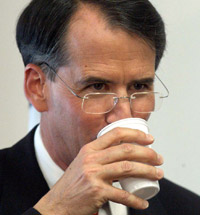The breaking news of this week, which relates to the contemporary history of Armenia and the Republic of Armenia, was published in the “California Courier” newspaper. The newspaper writes that the “rumors about the official resignation of the US Ambassador to Armenia, John Evans, are true.” The reason of the Ambassador’s resignation is his speech that he made in Berkley University of California. When speaking about the Armenian genocide he said that he had researched this issue. By naming the Armenian genocide the “first genocide of the century” the Ambassador mentioned, “I believe that things should be named by their real names.” This announcement was shocking and had expected outcome. We all know how the great powers of the world avoid calling the real names of things that have happened in the past, in particular the Armenian genocide. By not being a diplomat and not knowing all the diplomatic skills and nuances I’ dare to say that the most peculiar player was the Pope of Rome, John Paul II. In terms of diplomacy the late Pope has prayed for the victims of the genocide during his visit to “Tsitsernakaberd”. During his prayer instead of the word genocide he used the Armenian term – “yeghern”. By this subtle diplomatic move the official Vatican was able to justify themselves by saying that they hadn’t used the word “genocide”.
The biography of the US Ambassador John Evans doesn’t let us assume that the word “genocide” slipped from his lips. His 35-year diplomatic experience would hardly let anything like this happen. The official biography of the Ambassador mentions that the Ambassador has thoroughly researched the history of Russia and Ottoman Turkey. Therefore, in September 2004, when he was handing in his extraordinary diplomatic note as an Ambassador to the President of Armenia, he clearly knew what issues he was going to face. Unfortunately his speech last year didn’t have sufficient reaction in Armenia as it had in neighboring Turkey and Azerbaijan. It’s hard to imagine whether the Republic of Armenia or Armenian Diaspora were able to prevent the pressure on the Ambassador or not. The result is well-known – John Evans had to clarify his words twice. Later he was deprived of the “Disagreement” award because he had refuted the official attitude of the US. The honorable Armenian foreign policy didn’t succeed to contradict anything and this year the US Ambassador in Azerbaijan began to label the speeches of the Armenian President and the other Armenian high-ranked officials. “If the Armenians do not adopt a strict course, an incorrect opinion will be formed in the US according to which the Armenian genocide is not very important for Armenians,” writes “California Courier”. It’s hard not to agree with this. However, it’s very difficult to foresee what strict policy the Armenians should adopt and what must be undertaken for that. One thing is obvious. If the US government applies sanctions for Evans hardly anyone would ever be distracted from the main course of the US politics. The Armenian support may be construed as a “moral victory”. Unfortunately we are not able to show a more “tangible” support. The official web site of the US embassy in Armenia mentions that years ago, in 1988, John Evans was awarded a gratitude certificate by Soviet Armenia for his great help to coordinate the US humanitarian aid given to Armenia.
At present neither Evans nor the State Department officially say anything about the possibility of the Ambassador’s resignation. However, according to unofficial sources the US Senate has already ratified the candidature of the new Ambassador. (They speak about the US Ambassador to Tajikistan Richard E. Hogland). Perhaps it would be wrong to be silent and not speak out on this. Nevertheless, the press secretary of the Foreign Ministry of Armenia has recently contradicted the announcement of the US Ambassador to Azerbaijan, Rino Harnish by stating that the latter has “influence from Baku”. Instead no one raises his/her voice to say a good word to the person who said, “I think for us, Americans, it is not good to play word games and it’s time to call things by their real names”. Perhaps the diplomatic statement, “The person has a tongue to hide his opinions” is right in this aspect. But in this case it’s hard to understand why the diplomat with a 30-year experience spoke out. And it’s even more distinct why he has spoken about 1915 just like us and in our words.

